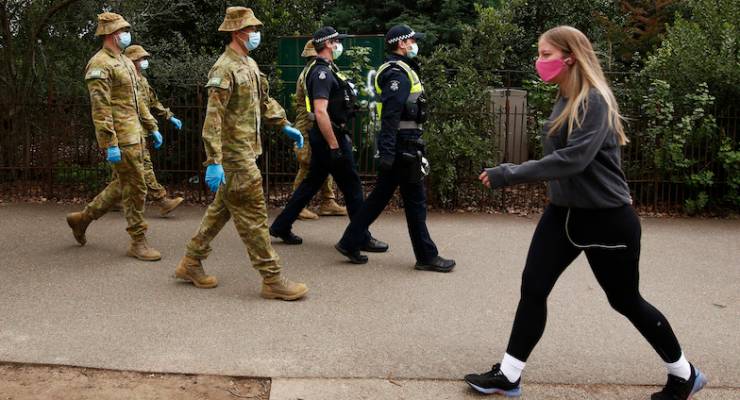
If I selfishly broke lockdown restrictions for some frivolous socialising outside my Melbourne home, I could be slugged with a $1652 fine.
I’d survive, but the bank balance battering would be a sufficient deterrent even if I wasn’t concerned about my community’s health. For poorer people, a financial whack the size of two car registrations could mean forgoing meals or missing rent payments.
But if the now-infamous “Karen from Brighton” (real name Jodi Grollo) decided her restlessness was simply unbearable and ventured out to the Tan, she would pay the exact same amount, despite being the daughter of a pokies billionaire living in one of Melbourne’s richest suburbs.
A mild inconvenience perhaps, but this is nothing an heir to a gambling dynasty is likely to sweat over before making irresponsible decisions. Is this fair? Is it even effective?
Fines issued by state and local governments rarely make front-page news. But now that the pandemic has necessitated health restrictions that are predominantly being enforced through hefty fines, it’s worth re-examining the efficacy of one-size-fits-all penalties.
Bankrupting for some, loose change for others
Victoria Police doled out more than 100 fines a day this weekend and last, with total fines for the pandemic totalling well over $10 million in Victoria alone. Now that masks have been made mandatory in Melbourne and Mitchell Shire, another $200 fine for non-compliance has been introduced.
Activists and journalists have noted the disproportionate numbers of pandemic fines issued in multicultural and lower socio-economic communities with the least capacity to pay.
But even if fines were issued in a transparent and objective manner across all neighbourhoods, the set nominal amount still hits some harder than others. Poorer individuals either suffer disproportionate hardship, or live in fear of legitimate mistakes on which the rich don’t bat an eyelid.
The clear solution is for state governments to make fines relative to the offender’s income. This already happens in multiple European countries and Argentina in relation to speeding and traffic fines, while Finland has pioneered the innovative model of “day fines” for most monetary penalties.
If a Finn is caught speeding, for example, they are fined an estimate of half their usual spending money per day, for a set number of days depending on the severity of the offence. The average reckless driver pays approximately €30-50 per day up to a €400-500 total.
But if you’re extremely rich, the sums can be eye-watering. In 2002, former Nokia director Anssi Vanjoki paid a mammoth €116,000 fine for doing 75km per hour in a 50km zone.
Legal academics have recognised the benefits of the day fines system in deterring both the rich and poor equally from committing crimes.
Conversely, the regressive system dominant in Australia, the US and UK struggles to weigh punishments to individual means. Some studies show the rich are more likely to break the law while driving as a result.
A fine time for reform
The ACT investigated the merits of an income-based fine system for traffic and parking offences last year, as proposed by the Greens, but the chief minister found the proposed scheme was “not practical or feasible” given the complexity of adapting a uniform system to account for varied individual circumstances.
NSW Labor also considered a similar proposal at their state conference and committed to a review.
But both actions came before the pandemic, which has exploded the number and severity of fines as a mechanism for law enforcement. To ensure health restrictions are enforced equitably and norms are established for future emergencies, progressive reform is worth reconsidering.
The Australia Institute (TAI) has long championed the introduction of income-based fine systems and provided reasonable models with implementation. For instance, TAI proposes the following tiered system for traffic violations:

There are important questions to ask about the balance between punishment and encouragement during the pandemic; the goal is to promote broad behavioural change, but we know some people will find it much harder to comply with restrictions than others. Nonetheless, sanctions for unlawful behaviour are a justifiable tool, provided they operate fairly.
When responding to “Karen from Brighton”, Daniel Andrews emphasised that we all must follow the rules, “whether you live in Broadmeadows or Brighton”. If that message isn’t getting through to some Brightonians, maybe they need to feel the same financial stress as those in Broady.








Crikey is committed to hosting lively discussions. Help us keep the conversation useful, interesting and welcoming. We aim to publish comments quickly in the interest of promoting robust conversation, but we’re a small team and we deploy filters to protect against legal risk. Occasionally your comment may be held up while we review, but we’re working as fast as we can to keep the conversation rolling.
The Crikey comment section is members-only content. Please subscribe to leave a comment.
The Crikey comment section is members-only content. Please login to leave a comment.